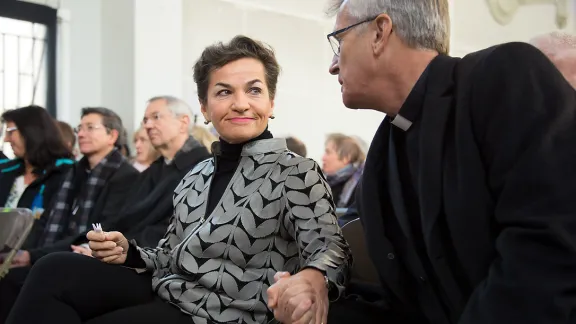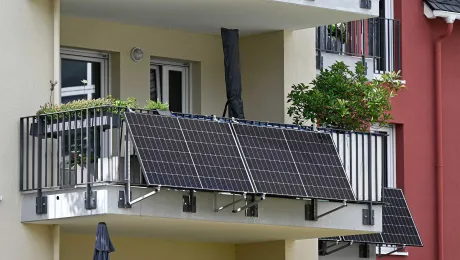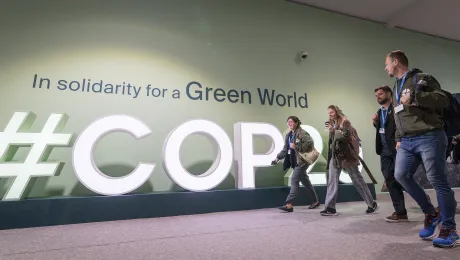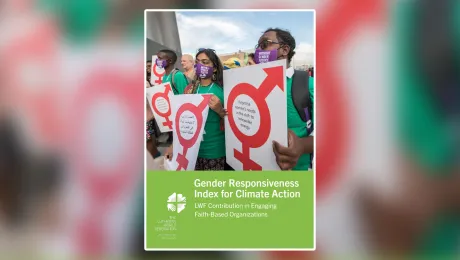
Christiana Figueres, Executive Secretary of the United Nations Framework Convention on Climate Change (UNFCCC), greets LWF Secretary General Martin Junge before a ceremony for the presentation of some 1.8 million signatures on an interfaith petition for climate justice during the COP21 climate summit in Paris, France, November 28, 2015. Photo: LWF/Ryan Rodrick Beiler
“What a step and what a goal. Let's put all our weight behind it."
The agreement commits countries to keep the global temperature rise to well below two degrees Centigrade, while making all efforts to keep it to within 1.5 degrees. It is hoped the agreement - the most significant in history - will unleash worldwide action and investment in low-carbon, resilient and sustainable technology.
Leaders of 195 countries agreed developed countries shall support developing countries to adapt and grow in a clean and sustainable way. They promised to support countries to further develop ways of addressing loss and damage caused by climate change.
Church leaders stressed the critical role churches and faith-based organizations played in the process leading up to Paris. They urged churches to now push global leaders to implement the agreement.
When the agreement was announced, general secretary of the World Council of Churches, Rev. Dr Olav Fykse Tveit, used his Twitter account to express gratitude and hope, “The Paris Agreement is a reality. We have the right to hope! Thanks to God! And thanks to all who have walked steps towards climate justice.”
The Lutheran World Federation general secretary Rev. Dr Martin Junge welcomed the historic achievement by posting, “What a step and what a goal. Let's put all our weight behind it. The big difference to get us there is the little difference each of us can make.”
“Well done to the joint ACT Alliance, LWF, and WCC team in Paris for your hard work resulting into an ambitious climate agreement,” tweeted Dr John Nduna, general secretary of ACT Alliance.
Over 100 people from the three organizations worked alongside other faith and civil society representatives at Paris.
For Tveit, Junge and Nduna, COP21 would not have reached an agreement without the global climate movement, which included many churches and religious organizations.
Last week, Daniele Violetti, chief of staff of the United Nations climate change body praised the role of inter-faith organizations. “Thank you for all that you did on the way to Paris and during the conference. The moral imperative has been at the center of the climate talks and that is a direct consequence of your engagement,” said Violetti. “You continue to want to be engaged. This is essential,” he added.
No guarantee of a safe world
Nevertheless, experts agree, the deal in itself will not deliver a safe world. World leaders must review commitments in 2023 and scale up action by 2025. The review will be every five years.
Tveit said that the agreement required our continuous mobilization to ensure that leaders live up to their stated commitments.
Rev. Fletcher Harper, from Our Voices, the global faith and spiritual climate action network, stressed “the commitments must be made real. All of us will need to play a part.”. “We're ready for the next stage of this journey. This agreement represents the end of the beginning of humanity's reckoning with climate change.”
This press release was jointly produced and published with the World Council of Churches and ACT Alliance.


